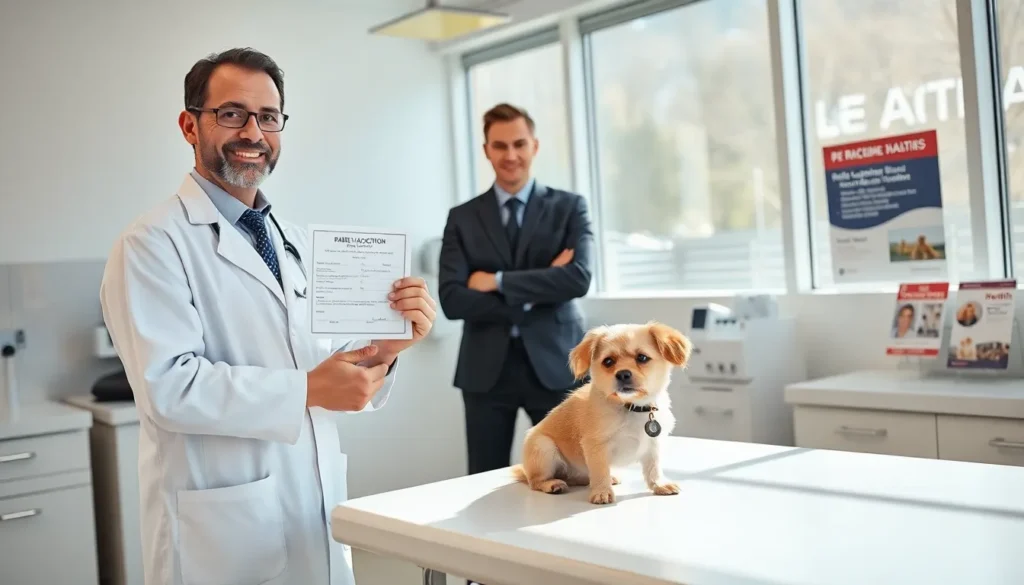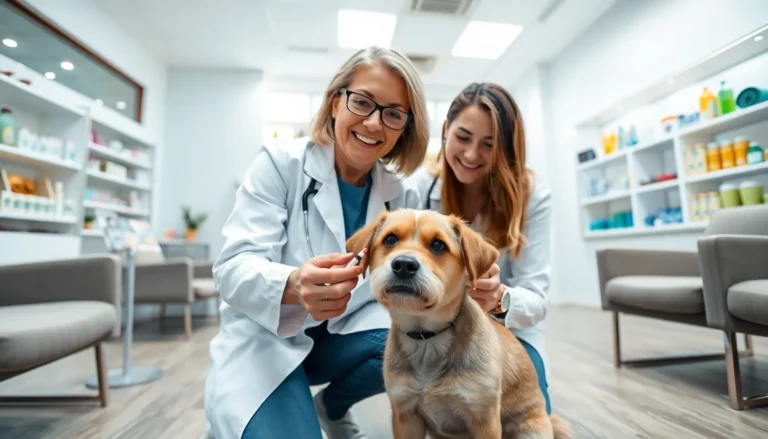In a world where rabies is lurking around the corner, the importance of a rabies vaccination certificate cannot be overstated. Picture this: you’re planning a lovely trip, but then you realize your furry friend can’t join unless they’ve got that important little piece of paper. It’s like a VIP pass but for pets – and trust us, no one wants to miss the furry fiesta at the beach. Let’s jump into the nitty-gritty of rabies vaccination, the benefits, the how-tos, and everything in between, so you and your pet are ready to hit the road worry-free.
Table of Contents
ToggleUnderstanding Rabies Vaccination

Importance of Vaccination
Rabies is a serious viral disease that affects the central nervous system of mammals, including humans. Once symptoms appear, the disease is almost always fatal. This is why a rabies vaccination is not just a good idea: it is essential. Vaccinating pets helps protect them from this life-threatening virus and lowers the risk of transmission to humans. In areas where rabies is common, vaccination can mean the difference between life and death.
How Rabies Spreads and Its Risks
Rabies spreads primarily through the bites of infected animals, most commonly bats, raccoons, and foxes. Once bitten, the virus travels through the body and attacks the nervous system. Symptoms can take months to appear, making it even more critical for pet owners to understand the risks. An unvaccinated pet can quickly become a host for the virus, jeopardizing public health and safety.
Rabies Vaccine Types
There are different types of rabies vaccines available for pets, each approved by regulatory agencies. Common types include inactivated rabies vaccines, which are non-infectious and often used for dogs and cats, and live attenuated vaccines. The specifics can depend on local regulations and the pet’s health history, so it is always best to consult with a veterinarian to determine what’s right for your pet.
Process of Obtaining a Rabies Vaccination Certificate
Requirements for Vaccination
Before obtaining a rabies vaccination, pet owners should ensure that their pet meets specific health criteria. Generally, pets should be at least three months old and in good health. A complete physical examination by a veterinarian is necessary. Various forms of identification, such as a microchip or collar ID, are also helpful.
Steps to Get the Certificate
Getting a rabies vaccination certificate consists of a few simple steps. First, make an appointment with a licensed veterinarian. During the visit, the vet will administer the rabies vaccine if your pet meets the health requirements. After administering the vaccine, the veterinarian will provide a certificate with crucial details such as the vaccination date, type of vaccine used, and the veterinarian’s credentials. Keep this certificate safe, as it may be needed for travel or boarding.
Where to Get Vaccinated
Veterinarian Clinics
The most common place to obtain a rabies vaccination is at a veterinarian clinic. These facilities offer professional care and can provide guidance on additional vaccinations that may be necessary. Most clinics keep comprehensive records, ensuring that your pet’s vaccination history is accurate and up to date.
Public Health Departments
In some areas, public health departments also administer rabies vaccinations, often at reduced rates or during special events. They can be a valuable resource for pet owners looking to ensure their pets are vaccinated, especially for those who might find a private vet service too expensive.
Travel and Rabies Vaccination Regulations
Country-Specific Requirements
Traveling with pets can be a complicated try. Different countries have distinct rabies vaccination requirements that must be met before entry. Some may require a rabies vaccination at least 21 days before arrival, while others may have additional health protocols. It’s crucial for pet owners to research the regulations of their destination well in advance.
Documentation for International Travel
When traveling internationally, pet owners usually need to present the rabies vaccination certificate along with an international health certificate. Some countries may require proof of a rabies titer test to confirm the efficacy of the vaccine. Always double-check the specific documentation needed to avoid unwanted surprises at the border.
Validity and Renewal of the Certificate
Duration of Protection
Rabies vaccination certificates typically remain valid for one to three years, depending on the vaccine used and local regulations. It’s essential to understand when the certificate expires to ensure that you’re complying with local laws and keeping your pet safe. Trusted vaccines provide adequate protection, but their effectiveness can diminish over time.
When to Re-vaccinate
Re-vaccination is critical to maintaining your pet’s immunity. Most vets recommend re-vaccinating pets every one to three years, depending on the type of vaccine and the pet’s risk of exposure to rabies. Always consult with a veterinarian for tailored advice about your pet’s health routine.




